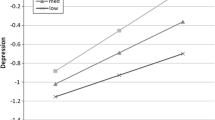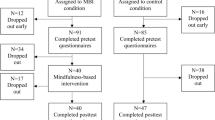Abstract
Using two measures of positive automaticthoughts (PATs) and other archival data from fourprevious studies, the author compared the ability ofPATs and States of Mind (SOM) ratio to moderate therelationship between negative events and dysphoria bothcross sectionally and longitudinally. In three of fourcross-sectional analyses but in none of threelongitudinal analyses, PATs moderated the negativeevent-dysphoria relationship. For more frequent PATs, negativeevents were less related to dysphoria. In one of fourcross-sectional analyses and one of three longitudinalanalyses, SOM ratio moderated the negativeevent-dysphoria relationship such that, for higher SOM ratio,negative events were less predictive of dysphoria.Results were similar whether PATs were measured with theAutomatic Thoughts Questionnaire-Positive or the Automatic Thoughts Questionnaire-Revised instudies 1-3 but differed across these instruments insome analyses in study 4. It is argued that, ascognitive products, state cognitions and SOM ratio maybe unlikely to moderate stress effectsconsistently in longitudinal studies. It is recommendedthat, in studies of dysphoria and depression,researchers investigate (1) cognitions X cognitivestructure interactions and (2) domain-specific belief X life eventinteractions.
Similar content being viewed by others
REFERENCES
Arnkoff, D. B., Glass, C. R., & Robinson, A. S. (1995). Cognitive processes, anxiety, and performance on doctoral dissertation oral examinations. Journal of Counseling Psychology, 39, 382–388.
Bandura, A. (1997). Self-efficacy: The exercise of control. New York: W. H. Freeman.
Barnett, P. A., & Gotlib, I. H. (1988). Dysfunctional attitudes and psychosocial stress: The differential prediction of future psychological symptomatology. Motivation and Emotion, 3, 251–270.
Beck, A. T., Steer, R. A., & Garbin, M. G. (1988). Psychometric properties of the Beck Depression Inventory: Twenty-five years of evaluation. Clinical Psychology Review, 8, 77–100.
Bruch, M. A. (1997). Positive thoughts or cognitive balance as a moderator of the negative life events-dysphoria relationship: A reexamination. Cognitive Therapy and Research, 21, 25–38.
Bruch, M. A., Heimberg, R. G., & Hope, D. (1991). States of mind model and cognitive change in treated social phobics. Cognitive Therapy and Research, 15, 429–441.
Bumberry, W., Oliver, J. M., & McClure, J. (1978). Validation of the Beck Depression Inventory in a university population using psychiatric estimate as a criterion. Journal of Consulting and Clinical Psychology, 46, 150–155.
Burgess, E., & Haaga, D. A. F. (1994). The Positive Automatic Thoughts Questionnaire (ATQ-P) and the Automatic Thoughts Questionnaire — Revised (ATQ-RP): Equivalent measures of positive thinking. Cognitive Therapy and Research, 18, 15–23.
Coyne, J. C., & Whiffen, V. E. (1995). Issue s in personality as diathesis for depression: The case of sociotropy-dependency and autonomy-self-criticism. Psychological Bulletin, 118, 358–378.
Dohr, K. B., Rush, A. J., & Bernstein, I. H. (1989). Cognitive biases and depression. Journal of Abnormal Psychology, 98, 263–267.
Glass, C. R., Arnkoff, D. B., Wood, H., Meyerhoff, J. L., Smith, H. R., Oleshansky, M. A., & Hedges, S. M. (1995). Cognition, anxiety, and performance on a career-related oral examination. Journal of Counseling Psychology, 42, 47–54.
Haaga, D. A. F., Dyck, M. J., & Ernst, D. (1991). Empirical status of the cognitive theory of depression. Psychological Bulletin, 110, 215–236.
Hollon, S. D., & Kendall, P. C. (1980). Cognitive se lf-statements in depression: Development of an Automatic Thoughts Questionnaire. Cognitive Therapy and Research, 4, 383–395.
Ingram, R. E., & Kendall, P. C. (1986). Cognitive clinical psychology. In R. E. Ingram (Ed.) Information processing approaches to clinical psychology. Orlando, FL: Academic Press.
Ingram, R. E., Kendall, P. C., Siegle, G., Guarino, J., McLaughlin, S. C. (1995). (1995). Psychometric properties of the Positive Automatic Thoughts Questionnaire. Psychological Assessment, 7, 495–507.
Ingram, R. E., & Wisnicki, K. S. (1988). Assessment of positive automatic cognition. Journal of Consulting and Clinical Psychology, 56, 898–902.
Jolly, J. B., & Wiesner, D. C. (1996). Psychometric properties of the Automatic Thoughts Questionnaire-Positive with inpatient adolescents. Cognitive Therapy and Research, 20, 481–498.
Kendall, P.C., Hollon, S.D., Beck, A. T., Hammen, C.L., & Ingram, R.E. (1987). Issues and recommendations regarding use of the Beck Depression Inventory. Cognitive Therapy and Research, 11, 289–299.
Kendall, P. C., Howard, B. L., & Hays, R. C. (1989). Self-referent speech and psychopathology: The balance of positive and negative thinking. Cognitive Therapy and Research, 6, 583–598.
Krantz, S. E., & Liu, C. (1987). The effect of mood and information valence on depressive cognition. Cognitive Therapy and Research, 11, 185–196.
Kwon, S., & Oei, T. P. S. (1992). Differential causal roles of dysfunctional attitudes and automatic thoughts in depression. Cognitive Therapy and Research, 16, 309–328.
Lakey, B., & Ross, L. T. (1994). Dependency and self-criticism as moderators of interpersonal and achievement stress: The role of initial dysphoria. Cognitive Therapy and Research, 18, 581–599.
Lightsey, O. R. Jr. (1994a). Positive automatic cognitions as moderators of the negative life event-dysphoria relationship. Cognitive Therapy and Research, 18, 353–365.
Lightsey, O. R. Jr. (1994b). "Thinking positive" as a stress-buffer: The role of positive automatic cognitions in depression and happiness. Journal of Counseling Psychology, 41, 325–334.
Lightsey, O. R. Jr. (1996). What leads to wellness? The role of psychological resources in well-being. The Counseling Psychologist, 24, 589–735.
Lightsey, O. R. Jr. (1997). Stress buffers and dysphoria: A prospective study. The Journal of Cognitive Psychotherapy, 11, 263–277.
Lightsey, O.R. Jr., & Christopher, J. C. (1997). Stress buffers and dysphoria in a non-Western population. Journal of Counseling and Development, 75(6), 451–459.
Madigan, R. J., & Bollenbach, A. K. (1986). The effects of induced mood ion irrational thoughts and views of the world. Cognitive Therapy and Research, 10, 547–562.
Olinger, L. J., Kuiper, N. A., & Shaw, B. F. (1987). Dysfunctional attitudes and stressful life events: An interactive model of depression. Cognitive Therapy and Research, 11, 25–40.
Olioff, M., Bryson, S. E., & Wadden, N. P. (1989). Predictive relation of automatic thoughts and student efficacy to depressive symptoms in undergraduate s. Canadian Journal of Behavioural Science, 21, 353–363.
Pedhazur, E. J. (1982). Multiple regression in behavioral research: Explanation and prediction. New York: Holt, Rinehart, & Winston.
Sarason, I. G., Johnson, J. H., & Siegel, J. M. (1978). Assessing the impact of life changes: Development of the Life Experiences Survey. Journal of Consulting and Clinical Psychology, 46, 932–946.
Scheier, M. F., & Carver, C. S. (1992). Effects of optimism on psychological and physical well-being: Theoretical overview and empirical update. Cognitive Therapy and Research, 16, 201–228.
Schwartz, R. M., & Garamoni, G. L. (1989). Cognitive balance and psychopathology: Evaluation of an information processing mode l of positive and negative states of mind. Clinical Psychology Review, 9, 271–294.
Schwartz, R. M., & Michelson, L. (1987). States-of-mind mode l: Cognitive balance in the treatment of agoraphobia. Journal of Consulting and Clinical Psychology, 55, 557–565.
Watson, D., Clark, L. A., & Tellegen, A. (1988). Development and validation of brief measures of positive and negative affect: The PANAS scales. Journal of Personality and Social Psychology, 54, 1063–1070.
Rights and permissions
About this article
Cite this article
Lightsey, O.R. Positive Thoughts versus States of Mind Ratio as a Stress Moderator: Findings Across Four Studies. Cognitive Therapy and Research 23, 469–482 (1999). https://doi.org/10.1023/A:1018716303842
Issue Date:
DOI: https://doi.org/10.1023/A:1018716303842




